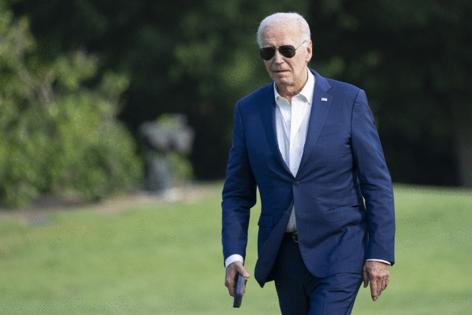Francis Wilkinson: Biden's graceful exit shows how a healthy party should work
Published in Op Eds
President Joe Biden delivered his after-action report to the nation tonight. His conclusion: Mission accomplished.
In an Oval Office address that was often moving, and mindful of this season’s democratic peril, Biden unfurled a litany of achievements. But he made it clear that in the wake of departing the Democratic ticket he intends to occupy the high ground of democracy, now and in history. “I revere this office,” he said. “But I love my country more.”
The speech allowed the president to put his own belated imprint on the remarkable weeks following his poor debate performance on June 27, when an emergent power, a sprawling, divergent collection of people and aspirations known as the Democratic Party, displaced Biden as the party’s principal power. Biden and his top staff resisted the hive mind, but could not overcome it. When at last Biden relented, announcing his withdrawal from the race, the party speedily rallied around his successor, endorsee and most obvious replacement, Vice President Kamala Harris. American politics remains full of surprises.
Biden no doubt didn’t enjoy having his ride to November rescinded. But “the sacred cause of this country is larger than any one of us,” he said, and “ nothing can come in the way of saving our democracy. That includes personal ambition.” Biden’s voluntary relinquishment of power will have long reputational benefits. Democrats who feared Biden might don Jimmy Carter’s one-term cardigan are now fitting him for George Washington’s wig.
All of this is evidence that Biden leads — well, led — a healthy political party. The president’s acquiescence to former Speaker Nancy Pelosi and other influential Democrats was the result of a high-wire act in which party leaders skillfully coordinated, prodding the president’s withdrawal without ever renouncing him. In the end, game respected game: Biden withdrew. The Democratic rank and file, two-thirds of whom said they wanted a new candidate, endorsed the move with an historic gush of donations and enthusiasm.
Georgetown University political scientist Hans Noel, co-author of The Party Decides, an influential book about how parties and their elites select candidates, told me in an email: “The main point of our book was not that the party could force any outcome, but rather that party leaders care about who the nominee is and are capable of coordinating to try to influence the outcome. And that’s what happened here, both in encouraging Biden to step aside and in coalescing around Harris.”
Noel’s co-author, University of Maryland political scientist David Karol, added, “It reflects the strength of the Democratic Party, unified by hatred and fear of Trump, that they got him to withdraw in an unprecedented way with only a few weeks of awkwardness.”
That success stands in sharp contrast to the failure of Republican elites to protect their party, and the nation, from the demagogue who has dominated GOP politics for eight years, transforming much of the party base into a personality cult.
As Steven Levitsky and Daniel Ziblatt, authors of How Democracies Die, wrote, “An essential test for democracies is not whether such figures emerge but whether political leaders, and especially political parties, work to prevent them from gaining power in the first place — by keeping them off mainstream party tickets, refusing to endorse or align with them and, when necessary, making common cause with rivals in support of democratic candidates.”
Examples of Republican bravery — former Representative Liz Cheney comes quickly to mind — have been exceedingly rare. “Isolating popular extremists requires political courage,” Levitsky and Ziblatt wrote. “But when fear, opportunism or miscalculation leads established parties to bring extremists into the mainstream, democracy is imperiled.”
Ultimately, it was that Republican failure that inspired the Democratic Party’s success in convincing Biden to cede to Harris. In his remarks, Biden tacitly endorsed the party’s action. “The defense of democracy is more important than any title,” Biden said.
Would Democrats have moved in such unison, with such speed, if the Republican nominee for president were Senator Mitt Romney of Utah? I suspect not. A second Trump presidency promises a torrent of lies, corruption and a full-scale assault on both democratic values and institutions. Trump’s authoritarian menace focused the Democratic minds.
Biden was, in one sense, the victim of that dynamic. But in a very powerful sense he is also its beneficiary. As Biden said Wednesday night, “The great thing about America is here, kings and dictators do not rule. The people do.”
If democracy succumbs to Trumpist darkness and MAGA thrusts at “termination” of the Constitution, the memory of Biden’s presidency won’t be a source of much light. Biden rose to the occasion by thwarting his own ambition. The baton is passed. The mission is up to others. “Whether we keep our republic,” he told the nation, “is now in your hands.”
_____
Francis Wilkinson is a Bloomberg Opinion columnist covering US politics and policy. Previously, he was executive editor for the Week and a writer for Rolling Stone.
_____
©2024 Bloomberg News. Visit at bloomberg.com. Distributed by Tribune Content Agency, LLC.




























































Comments